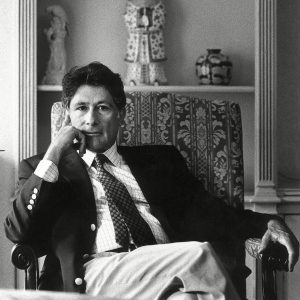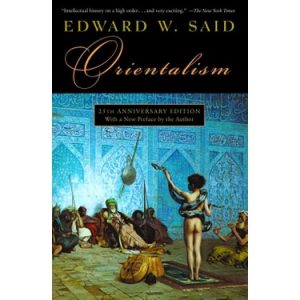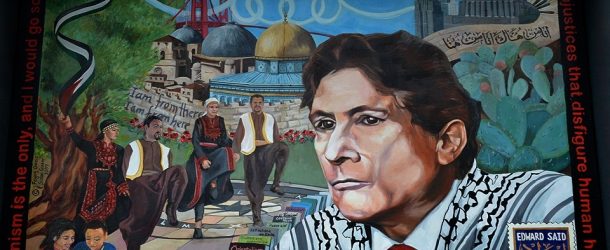Introduction
The Hamas attack on Israel on October 7, 2023, and the emergence of the 2023 Hamas-Israeli War brought the Israeli-Palestinian conflict or the Palestinian Problem to the center of global politics once again. The origins of the conflict go back to the early 20th century and in fact, almost everything is already said by both sides to legitimize their position. However, to better understand the position of Palestinians and the so-called biased approach in the Western public, it might be timely to take a look at famous Palestinian thinker Edward Said’s original ideas stated in his chef d’oeuvre Orientalism.

Edward Said
Edward Said: Biography
Edward Wadie Said (1935-2003) (born November 1, 1935, Jerusalem – died September 25, 2003, New York, U.S.), was a Palestinian-American academic, political activist, and literary critic who examined literature in light of social and cultural politics and was an outspoken proponent of the political rights of the Palestinian people and the creation of an independent Palestinian State.[1] Served long years as a Professor of Literature at Columbia University, Said was among the founders of postcolonial studies and the most influential pro-Palestinian intellectual figure in the U.S. Born in Mandatory Palestine, he was a citizen of the United States by way of his father, a U.S. Army veteran.[2] Fluent in English, French, and Arabic, Said studied Princeton University’s Literature Department with a study called “The Moral Vision: André Gide and Graham Green”. Said later completed his MA and Ph.D. degrees in the Department of English Literature at Harvard University in 1960 and 1964 respectively. His Ph.D. thesis was on British novelist Joseph Conrad. His first book, Joseph Conrad and the Fiction of Autobiography (1966), was the expansion of his doctoral thesis. He became a Full Professor in 1969 and became a very famous and influential figure in Western academia with his Orientalism work in 1978. Being one of the most influential books of the 20th century, the book made Said a star with his unique views about the false stereotypes about the Islamic world among Western intellectuals and the public.

Said protesting Israel by throwing a stone
With this work, Said became a political figure as well, and although he never taught about Middle East Politics, his critical stance on the U.S. and Israeli policies in the region turned him into a legendary figure in the Muslim and anticolonial world. In the year 2000, whilst touring the Middle East with his son, Said was photographed throwing a stone across the Blue Line Lebanese–Israel border, which image elicited much political criticism about his action demonstrating an inherent personal sympathy with terrorism. Consequently, in the Commentary magazine, the journalist Edward Alexander labelled Said as “The Professor of Terror”, for aggression against Israel[3]. Said in fact had always supported a peaceful resolution of the Palestinian Problem, but he became highly critical of the Oslo Peace process between the Palestine Liberation Organization and Israel in the early 1990s. Said’s books[4] about the Middle East include The Question of Palestine (1979), Covering Islam: How the Media and the Experts Determine How We See the Rest of the World (1981), Blaming the Victims: Spurious Scholarship and the Palestinian Question (1988; coedited with Christopher Hitchens), The Politics of Dispossession (1994), and Peace and Its Discontents: Essays on Palestine in the Middle East Peace Process (1995). Among his other notable books are; The World, the Text, and the Critic (1983), Nationalism, Colonialism, and Literature: Yeats and Decolonization (1988), Musical Elaborations (1991), and Culture and Imperialism (1993). Moreover, his autobiography, Out of Place (1999), reflects the ambivalence he felt over living in both the Western and Eastern traditions.
Orientalism
Edward Said is considered one of the most important and controversial Middle-East specialists in the world and he is known for his famous book Orientalism, which was first published in 1978 and changed the academic agenda for Middle-Eastern studies. Said who died in 2003, in his masterpiece, by using the post-structuralist Foucauldian method of binary oppositions, explained the working of the incredibly complex system of thought possessed by Westerners to describe the Orient. Said claimed that Orientalism is an imaginative system of thought created by Europeans to define the Orient and also themselves, the Occident.

Orientalism by Edward Said (1978)
In the book, Said tries to explain three different meanings of Orientalism; firstly, Orientalism in the academic sense which means studies related to the Orient: “The scientific discipline in the West according to which beginning in the early 19th century one specialized in the study of various Oriental cultures and traditions”. Secondly, the style of thought that is based upon ontological and epistemological differentiation made between the Orient and the Occident. Lastly and most importantly, a style of thought created by Europeans to have authority over the Orient: “The ideological suppositions, images, and fantasies about a currently important and politically urgent region of the world called the Orient”. Said, tried to explain these things in his article “Orientalism Reconsidered” as well in 1985[5]. Said deals with the second and especially third meanings of Orientalism and shows the immense power of Orientalism in the minds of European people.
The main idea in Edward Said’s Orientalism theory is that there is a biased style of thought that was created and has been used by Europeans (especially French and British) to define the Orient and also themselves. Unfortunately, Orientalism is also used to increase the legitimacy of Western imperialism. In Said’s thinking, Orientalism applies both to real and academic life in the Occident. Moreover, Said believes that Orientalism is so powerful that it affects the thoughts of people in the Orient and even the thoughts that are against Orientalism. He wrote; “Moreover, so authoritative a position did Orientalism have that I believe no one writing, thinking, or acting on the Orient could do so without taking account of the limitations on thought and action imposed by Orientalism”. Said’s main concern is not about finding solutions to this problem but rather analyzing the workings of Orientalism. The main argument of the article is that Orientalism is a historical product, the construction of power relations between the Occident and Orient, which was created by Westerners and which has been preventing people from having correct ideas about the East. In other words, Said claims that the Orient was orientalized by Europeans and thus, is not a free subject of thought (these are constructed conceptions). He wrote; “the relatively common denominator between these three aspects of Orientalism is the line separating Occident from Orient, and this, I argued, is less a fact of nature than it is a fact of human production, which I have called imaginative geography”. To substantiate his argument, Said gives us many examples from Western literature, political science, and anthropological theories. Kuchuk Hanem character in Gustave Flaubert’s novel, the approaches of Karl Marx and John Stuart Mill toward India, Montesquieu’s climate theory, the racial superiority theories in anthropology, the use of stereotypes in movies and advertisements or the imperial acts of European empires starting from 19th century are all examples of the immense strength of Orientalist discourse. But how did Orientalism become that widespread?
Said explains it as the benefit of Western countries to carry on Orientalism for having authority over the Orient. Starting from Cicero most of the writers, philosophers, and artists of the West have been using the East as a mystical, emotional, irrational, underdeveloped symbol that is inferior to the West in their works. All these ideas are transmitted from one generation to another and Orientalism continues to gain more power and more support. Said shows us that all the cornerstones in Western culture carry Orientalist elements and the Occident most of the time defines it by defining the imaginative, exact opposite of itself: the Orient. Edward Said concludes by saying that Orientalism intensifies divisions between East and West and makes things worse. Due to Orientalism, the Arab image in Western culture became a wicked one and the antipathy towards Western countries reached its peak in the East. However, even this antipathy is not a real one because it is highly affected by the Orientalist discourse. Said thinks that first of all, academicians and intellectuals should try to avoid Orientalism in their works to have unbiased, correct information about the Eastern world although it is impossible to be completely objective in social sciences. Orientalism discussion is very significant in Middle Eastern politics because we see that Western media continues to portray the developments in the Middle East from an Orientalist perspective.
In the article “Orientalism Reconsidered”, Said first redefines Orientalism as “a scientific movement whose analogue in the world of empirical politics was the Orient’s colonial accumulation and acquisition by Europe”[6]. He later talks about the criticism he had received after writing his famous book. He claims that Zionists, nativists, nationalists, and Islamic extremists have all attacked his theory from their point of view. Said later turns to explain the reproducers of the Orientalist discourse such as Bernard Lewis and Daniel Pipes. In his book The Muslim Discovery of Europe, Lewis tried to convince the readers that the “Western quest for knowledge about other societies is unique and that is motivated by pure curiosity, and in contrast, Muslims were neither able nor interested in getting knowledge about Europe”[7]. Daniel Pipes on the other hand, in his book In the Path of God: Islam and Political Power, talks about the anomie and incapacity for self-representation of Islam and the inferiority complex of Islamic societies and thus, serves to legitimize the aggressiveness and interventionism of the United States: “For Pipes, Islam is a volatile and dangerous business, a political movement intervening in and disrupting the West, stirring up insurrection and fanaticism anywhere else”[8]. Said does not accept these claims as scientific rather he thinks these are statements of power and claims for relatively absolute authority. Said also talks about the role of the Orientalist discourse in the rise of anti-Semitism and he criticizes Zionists for not seeing this reality. He wrote; “… hostility to Islam in the modern Christian West has historically gone hand in hand with, has stemmed from the same source, has been nourished at the same stream as anti-Semitism, and that a critique of orthodoxies, dogmas and disciplinary procedures of Orientalism contribute to an enlargement of our understanding of the cultural mechanisms of anti-Semitism”[9]. Said also talks about the funny idea of some Arab nationalists who judge his work as a part of an imperialist plot.
According to Edward Said, media plays a very important role in the expansion of the Orientalist discourse. In his view, “production of knowledge, or information, of media images is unevenly distributed” and the media reproduces this discourse by strengthening it”[10]. Western countries’ global economic and political power is one of the major reasons for this unfair distribution. Orientalist discourse does not analyze world history as a total unit but rather puts European modernization (Age of Exploration, Renaissance, Reform, Enlightenment, and Age of Industrialization) to the center and excludes Eastern societies from history. “The Orient was routinely described as feminine, its riches as fertile, its main symbols the sensual woman, the harem, and the despotic -but curiously attractive- ruler”[11]. This contrasting image of the East helps the West to define itself as democratic, rational, and strong.
Conclusion
To conclude, Edward Said’s writings are still relevant for understanding basic problems in the Western public in grasping the realities of the Palestinian Problem. First of all, the Palestinian Problem is not a war between Muslims and Jews and/or Muslims and Christians. In fact, there are numerous Christian Palestinians, especially in the West Bank, who still support the Palestinian Cause but are disregarded by the Western political elite and public. The Palestinian Problem is a land-based dispute between two political entities the Palestinians and the Israel. Since there is no agreement and peace between the two sides, all political actors can be labeled as defending their fatherland and territories. In that sense, both Hamas and Israel’s attacks toward civilians are very problematic but should be analyzed as a type of war crime rather than acts of terrorism. Secondly, the Western political elite and the public are not objective on this issue due to Nazi crimes in Europe in the 20th century which aimed to eradicate the Jewish race in addition to all different forms of anti-Semitic practices of European states in the past centuries. Because of this guilt feeling, the Western countries could not act as a fair judge on this issue and they have always encouraged Israel’s expansion until now. Thirdly, the Palestinian Problem is not good for neither Palestinians, nor Israelis and a fair solution based on the two-state model will bring peace, democracy, and normalcy to both countries. Lastly, those who defend Palestinians are not all terrorists and most of the people in many countries such as Türkiye for instance want peace in the region just because they are offended to see hospitals, mosques, and churches bombed and babies, children, and women dying every day. It should be a source of shame for Western countries to normalize these things under the name of struggle against terrorism.
Assoc. Prof. Ozan ÖRMECİ
[1] Britannica, “Edward Said”, Date of Accession: 11.12.2023 from https://www.britannica.com/biography/Edward-Said.
[2] Wikipedia, “Edward Said”, Date of Accession: 11.12.2023 from https://en.wikipedia.org/wiki/Edward_Said.
[3] See; https://www.commentary.org/articles/edward-alexander/professor-of-terror/.
[4] See; https://www.thriftbooks.com/a/edward-w-said/3463452/.
[5] See; https://www.jstor.org/stable/1354282.
[6] Edward Said, “Orientalism Reconsidered”, Cultural Critique, No. 1 (Autumn, 1985), p. 93.
[7] Ibid., p. 96.
[8] Ibid., p. 97.
[9] Ibid., p. 99.
[10] Ibid., p. 100.
[11] Ibid., p. 103.



















































